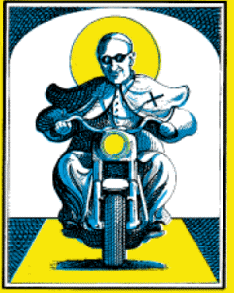Pope Francis made headlines yesterday by calling the Armenian genocide a genocide, but for his church, his more important pronouncement came on Saturday. Even as he declared that the Turkish slaughter of Armenians which began 100 years ago inaugurated a grim century of genocides, he announced a return to the mission of the Second Vatican Council, which wrapped up its business 50 years ago.
With the Council, the Church entered a new phase of her history. The Council Fathers strongly perceived, as a true breath of the Holy Spirit, a need to talk about God to men and women of their time in a more accessible way. The walls which too long had made the Church a kind of fortress were torn down and the time had come to proclaim the Gospel in a new way. It was a new phase of the same evangelization that had existed from the beginning.
Francis declared that the coming Jubilee Year will begin on December 8, to mark the anniversary of the council’s closing. And, quoting Pope John XXIII, the council’s progenitor whom he’s elevated to sainthood (“Now the Bride of Christ wishes to use the medicine of mercy rather than taking up arms of severity”), he made mercy its theme. His lengthy announcement is titled “The Face of Mercy” (Vultus Misericordiae). Calling it “the very foundation of the Church’s life,” he ordained that every Catholic cathedral keep a “Door of Mercy” open throughout the year.
It will hardly be lost on insiders that Francis is effectively institutionalizing his support for Cardinal Walter Kasper, who, in his recent book Mercy: the Essence of the Gospel and the Key to Christian Life, argues that mercy has in recent years been “criminally neglected” by the church. Kasper, of course, is the leading supporter of altering church rules to permit divorced and remarried Catholics to take Communion — an issue that the Synod of Bishops will resolve when it meets in October.
During the past two pontificates, Rome has pushed against the view that Vatican II signaled a major shift in the life of the church. John Paul II along with his successor Benedict XVI were, in important respects, about the business of a “reform of the reform,” returning to older ways of thinking, praying, and running things. In his Jubilee announcement, Francis goes so far as to turn John Paul II’s New Evangelization into an exercise in mercy: “In the present day, as the Church is charged with the task of the new evangelization, the theme of mercy needs to be proposed again and again with new enthusiasm and renewed pastoral action.”
In setting the theme for the Jubilee, Francis doubled down on the most famous and provocative pronouncement of his papacy, “Who am I to judge?” Quoting Jesus’ “Judge not, and you will not be judged” (Luke 6:37), he declared, “The Lord asks us above all not to judge and not to condemn. If anyone wishes to avoid God’s judgement, he should not make himself the judge of his brother or sister.” In what could well be the crucial months of his reform mission, Francis has thrown down the gauntlet.






